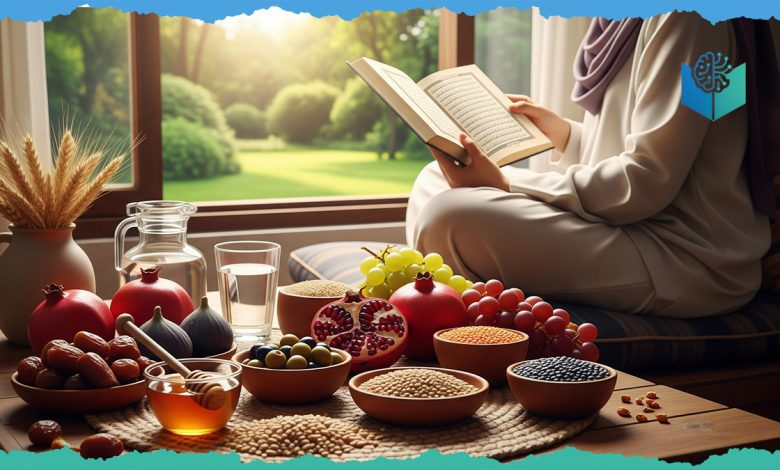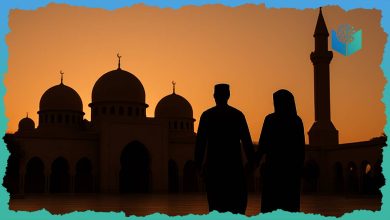Health and Nutrition in the Quran

In an age where health and wellness trends are constantly evolving, many people are looking for a more holistic and sustainable approach to well-being. For Muslims, the Quran and the teachings of the Prophet Muhammad (PBUH) provide a timeless and comprehensive framework for a healthy lifestyle. This framework is not just about what we eat, but also about how we live, emphasizing a balanced approach to physical, mental, and spiritual health. This article explores the principles of health and nutrition in the Quran, examining the foods it highlights, the benefits of fasting, and the broader wisdom it offers for a fulfilling and healthy life.
The Quran and a Healthy Lifestyle
The Quran guidance in daily life extends to every aspect of human existence, including our physical well-being. Islam views the body as a trust (amanah) from Allah, and taking care of it is a form of worship. The Quran encourages moderation and balance, warning against excess and waste.
Principles of a Healthy Diet in the Quran
The Quran and a healthy lifestyle are deeply connected.The Quran emphasizes consuming “tayyib” (pure, wholesome) foods. The verse, “O mankind, eat from whatever is on earth [that is] lawful and wholesome” (Quran 2:168), is a fundamental principle. This concept goes beyond just being “halal” (permissible) and includes foods that are good for the body. The Quran also explicitly forbids harmful substances, such as alcohol and pork, due to their potential negative effects on health.

Foods Mentioned in the Quran and Their Nutritional Benefits
The fact that the Quran and a healthy lifestyle are truly connected leads to the Quran mentioning several foods that are known for their significant nutritional value, encouraging their consumption as part of a healthy diet. These foods are not just sustenance; they are considered blessings from Allah.
Honey: A Divine Remedy
Honey is praised in the Quran as a source of healing. The verse, “There emerges from their bellies a drink, varying in colors, in which there is healing for people” (Quran 16:69), highlights its medicinal properties. Modern science has confirmed that honey has antibacterial, anti-inflammatory, and antioxidant properties. It can be used to treat wounds, soothe coughs, and boost the immune system.
Dates and Olives: Staple Superfoods
Dates appear in several Quranic verses and served as a key part of the Prophet’s diet. Rich in fiber, potassium, and magnesium, dates are an excellent source of quick energy and are often used to break the fast during Ramadan. The Quran also refers to the olive tree as a “blessed tree.” Olive oil, a key component of the Mediterranean diet, is rich in monounsaturated fats and antioxidants, known to be beneficial for heart health.

Pomegranates and Figs: Rich in Nutrients
The Quran mentions pomegranates and figs as fruits of Paradise. Pomegranates are packed with antioxidants, which can help protect the body from free radicals. Figs provide valuable fiber along with essential minerals such as calcium and iron. These fruits, along with grapes, are encouraged for their wholesome properties.
The Role of Fasting in Islam and Its Health Benefits
Fasting, especially during the month of Ramadan, is a pillar of Islam. While it is primarily a spiritual act, modern scientific research has confirmed the numerous health benefits of intermittent fasting that is a must when it comes to Quran and a healthy lifestyle.
Fasting and Physical Health
Fasting and health in Islam are deeply intertwined. Fasting gives the digestive system a much-needed rest, allowing the body to detoxify and repair itself. Studies on intermittent fasting have shown benefits such as improved insulin sensitivity, which helps regulate blood sugar levels, and increased cellular repair processes (autophagy). Fasting can also aid in weight management and improve cardiovascular health.
Fasting and Mental Well-being
Beyond the physical benefits, fasting has a profound impact on mental and spiritual health. It teaches self-discipline, patience, and empathy. The act of abstaining from food and drink helps in building mental resilience and a sense of gratitude. The spiritual focus during Ramadan, including increased prayer and recitation of the Quran, reduces stress and promotes a sense of inner peace.

Prophetic Nutrition: The Sunnah as a Guide
The Prophet Muhammad’s (PBUH) eating habits, known as prophetic nutrition, provide a perfect example of a balanced and moderate diet. He emphasized eating in moderation and never filled his stomach completely.He taught that the son of Adam does not fill any container worse than his stomach, and that just a few bites are enough to keep him upright and strong. But if it must be, then one-third for his food, one-third for his drink, and one-third for his breath.” This teaching aligns perfectly with modern nutritional advice on portion control.
Prophetic Remedies
The Prophet (PBUH) emphasized the importance of using natural remedies. In addition to honey, he spoke of the benefits of black seed (Nigella sativa), which he said was a cure for every disease except death. Black seed oil is now widely recognized for its anti-inflammatory and antioxidant properties. He also emphasized the consumption of barley, a fiber-rich grain, and encouraged the use of olive oil.
Conclusion
The Quran provides a holistic and timeless approach to health and nutrition. It views the body as a sacred trust and encourages a lifestyle of moderation, balance, and gratitude. By following the principles of consuming wholesome foods, practicing intermittent fasting, and emulating prophetic nutrition, Muslims can achieve not only physical well-being but also a deeper connection with their faith. While health fads come and go, the Quran offers enduring wisdom for living a healthy and fulfilling life. For further exploration and understanding of these teachings, resources like ayaat.ai can be incredibly helpful. The Quran’s guidance on health is an everlasting gift, leading to well-being that enriches both body and soul.
Q&A
What does the Quran say about nutrition?
The Quran emphasizes eating wholesome, lawful (halal) foods and avoiding excess or harmful consumption. It encourages moderation and gratitude for the blessings of food.
What does the Quran say about health?
The Quran emphasizes maintaining a balanced diet, avoiding excess, and caring for the body as a trust from God. It encourages cleanliness, moderation, and wholesome living to promote overall health.
What foods are mentioned in the Quran?
The Quran mentions various foods including dates, olives, grapes, figs, pomegranates, honey, and livestock like cattle and sheep. These foods are often highlighted for their nutritional and symbolic significance.





